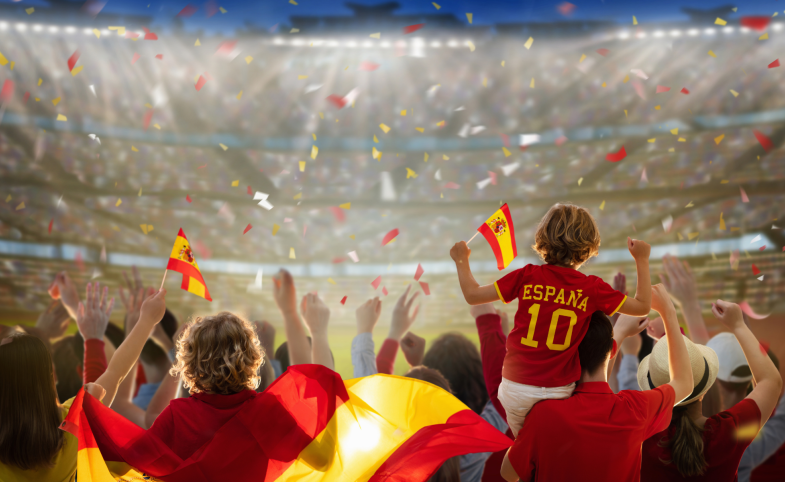Nothing confirms better the proposition that hard power is getting softer, and soft power harder than the grand spectacle of Qatar’s World Cup final. The standard Joe Nye definition of soft power has always put culture — in...
KEEP READINGThe CPD Blog is intended to stimulate dialog among scholars and practitioners from around the world in the public diplomacy sphere. The opinions represented here are the authors' own and do not necessarily reflect CPD's views. For blogger guidelines, click here.

Spanish Athletes Are Dominating: Will Spanish Public Diplomacy Follow Through?
You may have been hearing or thinking a lot about Spain in the past weeks. Maybe you heard the bars in your neighbourhood cheering at the UEFA Euro 2024 Final. Maybe you read the news on Monday and found headlines like “A New Prince Leads Spain as It Rules European Soccer Again” in The New York Times or “Carlos Alcaraz wants a seat at the adult table after his second Wimbledon and fourth Slam trophy” in The Washington Post. Or maybe you followed both the Wimbledon final and the UEFA Euro 2024 Final and saw with your own eyes the achievements of today’s Spanish athletes.
These victories in diverse disciplines not only reflect Spain's athletic prowess but also highlight an untapped opportunity for Spanish public diplomacy to enhance the nation's global image.
At 21 years old, Carlos Alcaraz won his second Wimbledon title and fourth Grand Slam (never before achieved at such a young age), becoming the second Spanish tennis player, after Rafael Nadal, to win titles at Roland Garros and Wimbledon in the same year. He is also one of only two men—joining Roger Federer—to win all of his first four Grand Slam Finals appearances.
Hours later, Spain’s men’s national soccer team won a record fourth European Championship title that did not go unnoticed. They won every single one of their matches in the tournament (seven) and scored 15 goals in total; two new records for the EURO. Spanish player Lamine Yamal became the youngest player to ever score at a EURO and the youngest to ever play at a EURO or World Cup Final. In the history of the European Championship, Spain has become the team that has the most titles, won the most matches, and scored the most goals.
That same day, Spanish golfer Sergio García won his first individual LIV Golf title; and his Spanish team Fireballs GC won a historic double playoff at home in Andalucia, where the LIV Golf competition was taking place. On the other side of the world, Spanish sailor Diego Botín and his crew crossed the finish line first at the SailGP Grand Final on San Francisco Bay.
On that single Sunday, Spain celebrated a series of spectacular victories that showcased the nation's athletic prowess on the world stage. In the months preceding this Super Sunday, other Spanish athletes have also been seen dominating their arenas. These victories are not just a testament to the talent and determination of the athletes but also present a unique opportunity for Spanish public diplomacy to leverage these successes in shaping Spain’s global image.
A recent Real Instituto Elcano report on Spain’s presence in international media found that 34% of international news articles about Spain focus on soccer. This percentage is the highest found among European countries known for their leadership in the sport, with the UK next at 26%, followed by Italy (18%), Germany (17%), and France (12%). When excluding soccer in the Spanish context, 33% of articles focus on sports (70%), culture (19%), or education (6%), making this group of news the largest share, followed by politics with 19% of articles. Moreover, three out of the top five institutions that are linked to Spain in international media are related to soccer, with FIFA being the most mentioned institution, even more than the European Union. This study reveals not only the importance of sports in Spain’s image abroad, but the potential of sports in shaping international public opinion about Spain.
And yet, despite this great potential, Spain has not included sports diplomacy programs or practices in the Ministry of Foreign Affairs’ public diplomacy strategy. There is a sports council within the Ministry of Education, Culture, and Sports that collaborates with other sports institutions worldwide and participates in EU sports diplomacy programs. But sports diplomacy is not ingrained in the priorities of Spain’s foreign service when conducting public diplomacy.
There has been some local action from Embassies of Spain, organizing watch parties across the globe for the Euro 2024 Final, demonstrating a more bottom-up approach based on the demands and preferences of specific target audiences.
At the Embassy of Spain in the United States, we are building a local sports diplomacy initiative, which aims to increase awareness about sports and Spanish athletes’ achievements through social media, as well as to launch more in-person events, both for the Spanish diaspora and for the American public, thereby contributing to Spain’s public diplomacy efforts as a whole.
As Spanish sports continue to thrive, the question remains: Will Spanish public diplomacy seize this unique opportunity to shine on the global stage? The potential is undoubtedly immense, and with the Olympic and Paralympic Games in Paris upon us, time is of the essence for this opportunity not to be missed, either by a centralized plan from the Ministry or by the implementation of local sports diplomacy practices.
Visit CPD's Online Library
Explore CPD's vast online database featuring the latest books, articles, speeches and information on international organizations dedicated to public diplomacy.
POPULAR ARTICLES
-
January 29
-
January 20
-
January 28
-
January 2
-
January 8
Join the Conversation
Interested in contributing to the CPD Blog? We welcome your posts. Read our guidelines and find out how you can submit blogs and photo essays >.













